|
|
|
Sort Order |
|
|
|
Items / Page
|
|
|
|
|
|
|
| Srl | Item |
| 1 |
ID:
120456


|
|
|
|
|
| Publication |
2013.
|
| Summary/Abstract |
When Afghans started fleeing abroad in the aftermath of the Saur Revolution of April 1978, Pakistan and Iran were the main countries of destination, but some Afghans also fled to India. This article offers new insights into one under-studied aspect of Indo-Afghan relations: population movements. What place have Afghan refugees occupied in Indo-Afghan relations (both formal and informal) from the Saur Revolution to the present? This article examines the specific situation of Afghan refugees in India, the general context of Indo-Afghan relations and India's ad hoc policy towards Afghan refugees, which all help explain the place occupied by Afghan refugees in Indo-Afghan relations.
|
|
|
|
|
|
|
|
|
|
|
|
|
|
|
|
| 2 |
ID:
120458
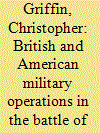

|
|
|
|
|
| Publication |
2013.
|
| Summary/Abstract |
In summer 2006, elements of the British Army were deployed to Helmand province in southern Afghanistan. The US Army followed with a surge in 2009 and 2010. The British and American military forces attempted to construct a counterinsurgency (COIN) approach to win the war in Helmand from 2006 until 2011, but the operational approach implemented was most often that of conventional warfighting. The inability to successfully implement COIN owed not to a lack of will, but rather to short tours, mission command, a lack of available resources, the particular situation on the ground in Helmand and the propensity of the Taliban to launch major conventional operations during much of the period in question.
|
|
|
|
|
|
|
|
|
|
|
|
|
|
|
|
| 3 |
ID:
120453


|
|
|
|
|
| Publication |
2013.
|
| Summary/Abstract |
This article seeks to explain the decisions by Nicolas Sarkozy's France and David Cameron's Britain to intervene in the 2011 Libyan crisis. None of the three major theories of international relations-constructivism, defensive realism and liberalism-can explain on its own such intervention decisions as the Libya case. The article's novel analytical model proposes that each theory emphasizes factors and mechanisms that explain part of the decision-making process and that these factors interact with state behaviour in complex ways. Britain and France initially began to consider intervention because they felt that the emergent norm of the 'responsibility to protect' applied to the Libyan case and because they believed the massive flows of refugees fleeing the violence were a threat to their border security. Both countries believed military intervention could be successful at relatively low cost and that if they did not intervene the problem would not be solved. At that point, the Sarkozy and Cameron governments engaged in initial action that made them more likely to intervene by jeopardizing their future economic relations with the Gaddafi regime and making him more likely to threaten them with future terrorist attacks. Taking initial action also meant that French and British prestige would ultimately have suffered had they not intervened to achieve a satisfactory solution to the crisis. Paris and London viewed international and regional support as a critical prerequisite for intervention and they sought and attained it. Finally, the Sarkozy and Cameron governments were able to minimize any domestic political risk of intervening because they had public and/or opposition party support.
|
|
|
|
|
|
|
|
|
|
|
|
|
|
|
|
| 4 |
ID:
120452
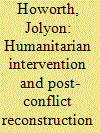

|
|
|
|
|
| Publication |
2013.
|
| Summary/Abstract |
It is over twenty years since the 'international community' embarked on what seems to be an increasingly regular policy of intervening in the internal affairs of states on humanitarian grounds. A massive literature has developed that analyses the theoretical, political, legal, normative and strategic dimensions of humanitarian intervention. This article engages with that literature and attempts to draw a provisional balance sheet for this twenty-first-century activity by examining a number of key cases and analysing the motivations and drivers behind the decision to intervene as well as the practical consequences of the intervention itself. In the context of the recent crises in Libya, Syria and Mali, which are seemingly comparable situations but which have produced significantly different policy preferences on the part of the international community, the article concludes that there are few clear prescriptions as to when intervention is and is not appropriate or justified. The cases examined suggest that, all too often, intervention takes place hastily and in ad hoc fashion with too little thought about the medium- and long-term consequences, which often turn out to be in contradiction with the original motives for intervention.
|
|
|
|
|
|
|
|
|
|
|
|
|
|
|
|
| 5 |
ID:
120460
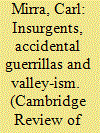

|
|
|
|
|
| Publication |
2013.
|
| Summary/Abstract |
In recent years Western policy towards Afghanistan has been marked by inconsistencies and errors. This article explores United States (US) soldiers' perceptions of the enemy in Afghanistan based on oral history interviews with dissenting combat soldiers who served in the Afghan theatre. By foregrounding soldiers' attitudes towards the enemy, this study includes marginalized voices, often overlooked, that challenge prevailing misconceptions. General David Petraeus, the former commander of US forces in Afghanistan, has argued that significant battlefield decisions are not reserved for generals alone. Petraeus' counterinsurgency programme promotes 'strategic corporals' whose decisions hold important consequences. If strategic corporals are involved in military decision-making, it follows that their interpretation of the conflict may also hold strategic implications for the researcher. Soldiers' views of war are not the final, authoritative verdict. However, this article suggests that these strategic corporals should be included in a complex matrix of interpretation to broaden US understanding of the enemy.
|
|
|
|
|
|
|
|
|
|
|
|
|
|
|
|
| 6 |
ID:
120454
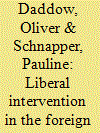

|
|
|
|
|
| Publication |
2013.
|
| Summary/Abstract |
David Cameron was a critic of Tony Blair's doctrine of the 'international community', which was used to justify war in Kosovo and more controversially in Iraq, suggesting caution in projecting military force abroad while in opposition. However, and in spite of making severe cuts to the defence budget, the Cameron-led Coalition government signed Britain up to a military intervention in Libya within a year of coming into office. What does this say about the place liberal interventionism occupies in contemporary British foreign policy? To answer this question, this article studies the nature of what we describe as the 'bounded liberal' tradition that has informed British foreign policy thinking since 1945, suggesting that it puts a distinctly UK national twist on conventional conservative thought about international affairs. Its components are: scepticism of grand schemes to remake the world; instinctive Atlanticism; security through collective endeavour; and anti-appeasement. We then compare and contrast the conditions for intervention set out by Tony Blair and David Cameron. We explain the similarities but crucially the vital differences between the two leaders' thinking on intervention, with particular reference to Cameron's perception that Downing Street needed to loosen its control over foreign policymaking after Iraq. Our argument is that policy substance, policy style and party political dilemmas prompted the two leaders to reconnect British foreign policy with its ethical roots, ingraining a bounded liberal posture in British foreign policy after the moral bankruptcy of the John Major years. This return to a pragmatic and ethically informed foreign policy meant that military operations in Kosovo and Libya were undertaken in quite different circumstances, yet came to be justified by similar arguments from the two leaders.
|
|
|
|
|
|
|
|
|
|
|
|
|
|
|
|
| 7 |
ID:
120457


|
|
|
|
|
| Publication |
2013.
|
| Summary/Abstract |
Afghanistan and the People's Republic of China (PRC) established diplomatic relations in 1955. Since that time, the changing relationship of China with Afghanistan has mirrored those of the PRC with other nation states. What began as an attempt by the PRC to establish international legitimacy for its new government and to offer third-world nations a socialist-communist path other than following the Soviet Union turned into a quest for natural resources. Using a variety of primary sources, including recently declassified intelligence files, secondary sources and open source material, this article traces the development of this changing relationship, demonstrating how it has complemented or complicated the United States' relationship with Afghanistan. It also shows how changing world events have affected the Chinese perception of the role Afghanistan can play in its foreign policy. The article concludes with a presentation of what role China is playing and can play in Afghanistan today, ending with a discussion of the dangers that the PRC faces in its current relations with Afghanistan, especially with regard to its ever-changing relationship with the United States.
|
|
|
|
|
|
|
|
|
|
|
|
|
|
|
|
| 8 |
ID:
120455
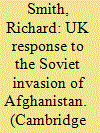

|
|
|
|
|
| Publication |
2013.
|
| Summary/Abstract |
Although not unexpected, the Soviet invasion of Afghanistan was still largely a shock to the West. It was the first time since the Second World War that the Soviets had directly intervened in a country outside the Warsaw Pact. Despite the intervention eventually being seen as Moscow's 'Vietnam' the West was initially unsure about what the invasion meant for stability in the region or the future conduct of East-West relations. In response to the crisis the UK Foreign & Commonwealth Office (FCO) proposed that Afghanistan revert to a neutral and non-aligned status in an attempt to create the basis for a viable political settlement, one that would allow the Soviet Union to withdraw troops without losing face. It launched the proposal in early 1980, lobbying other countries to support and champion the idea, culminating in a visit to Moscow by the Foreign Secretary, Lord Carrington, in July 1981. In this early phase of Soviet intervention the British proposals were premature but not without merit. They anticipated the strategy the Soviets would eventually adopt in their attempt to achieve an orderly withdrawal.
|
|
|
|
|
|
|
|
|
|
|
|
|
|
|
|
| 9 |
ID:
120459


|
|
|
|
|
| Publication |
2013.
|
| Summary/Abstract |
This article considers the role of United States Congress in the Afghanistan conflict-and notably that of the Armed Services and Foreign Relations Committees-from 2005 to 2009. Both of these committees had some legal oversight of the Afghan War, especially with regard to funding. During the first half of this period the Republicans had a majority while in the second half the Democrats took control. This led to differences in approach and method, which are here examined. Certainly, congressional committees operate generally in the open, which gives them a unique influence in framing issues in the press and thus before the public. Furthermore, five key members of the Obama administration belonged to these committees, attended their hearings and had much of their opinion shaped by their activities. An in-depth analysis of them during Bush's second term can provide us with valuable insights into the Obama administration's later policy decisions.
|
|
|
|
|
|
|
|
|
|
|
|
|
|
|
|
|
|
|
|
|